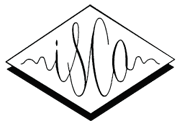Speech Disorder Classification Using Extended Factorized Hierarchical Variational Auto-encoders
(Oral presentation)
| Jinzi Qi (KU Leuven, Belgium), Hugo Van hamme (KU Leuven, Belgium) |
|---|
Objective speech disorder classification for speakers with communication difficulty is desirable for diagnosis and administering therapy. With the current state of speech technology, it is evident to propose neural networks for this application. But neural network model training is hampered by a lack of labeled disordered speech data. In this research, we apply an extended version of Factorized Hierarchical Variational Auto-encoders (FHVAE) for representation learning on disordered speech. The FHVAE model extracts both content-related and sequence-related latent variables from speech data, and we utilize the extracted variables to explore how disorder type information is represented in the latent variables. For better classification performance, the latent variables are aggregated at the word and sentence level. We show that an extension of the FHVAE model succeeds in the better disentanglement of the content-related and sequence-related related representations, but both representations are still required for best results on disorder type classification.







